Kia Sorento
Serpentine Accessory Belt Replacement Guide
How to change the serpentine accessory
belt on a 3rd generation 2016, 2017, 2018, 2019 and 2020 Kia Sorento.
By Paul B. Michaels Author & Photographer Auto Mechanic Since 1989 |
||
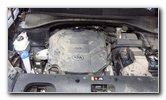 2019 Sorento 3.3L V6 |
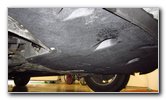 Under Engine Cover |
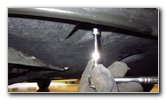 Loosen Counterclockwise |
|
This automotive maintenance tutorial was specifically written to assist owners of the third generation (2016, 2017, 2018, 2019 and 2020) Kia Sorento SUV in changing the serpentine accessory belt on the Lambda II GDI 3.3 liter V6 engine. (The procedure may be similar for the Theta II 2.4L I4 engine and the Theta II Turbocharged 2.0L I4 engine.) Owners of other Kia, Hyundai and Genesis vehicles such as the Soul, Seltos, Sportage, Niro, Telluride, Forte, Rio, Optima, Stinger, Cadenza, K900, Sedona, Kona, Venue, Santa Fe, Elantra, Sonata, Accent, Veloster, Ioniq, Nexo, G70, G80 and G90 may also find these instructions to be helpful. A few compatible replacement serpentine accessory belts for the Lambda II GDI 3.3L V6 engine with their part numbers are as follows: Gates K060747, Continental 4060747, Dayco 5060750 and ACDelco 6K747. The tools required to complete this procedure include a 10mm socket with a 1/4" drive ratchet and a 19mm socket with a 1/2" drive ratchet. The best way to access the belt is from the underside of the engine bay. You might be able to squeeze under the vehicle, but I chose to raise it for more working room. Carefully raise the front of the SUV with the floor jack and securely support it with at least two jack stands. Remove the bolts that secure the under engine cover or "skid plate" by turning them in the counterclockwise direction with the 10mm socket, a short extension bar and a 1/4" drive ratchet. |
||
|
|
||
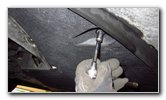 Remove Bolts |
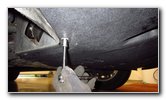 |
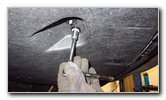 |
| Continue removing all of the bolts on the under engine cover. | ||
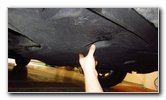 Pull Off Skid Plate |
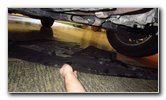 Slide Back Cover |
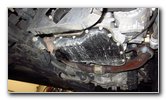 Oil Pan & Exhaust |
| Once you've removed all eleven bolts, pull off the cover and slide it back away from the engine. | ||
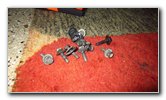 11 Bolts Removed |
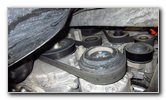 Belts & Pulleys - Under |
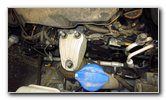 View of Belt From Top |
| With the cover removed, you'll be able to easily see the old belt and the various pulleys such as the crankshaft, tensioner, water pump (coolant pump), two idler pulleys, A/C compressor and alternator pulley. | ||
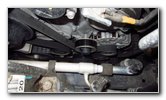 Inspect Belt Routing |
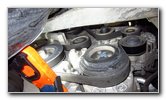 A/C Compressor |
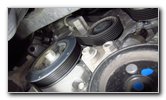 Water Pump & Idler |
| Take a moment to
study how the OEM (original equipment manufacturer) belt is routed around
the pulleys. I've also included a rough drawing of the belt routing diagram below. |
||
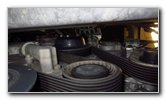 |
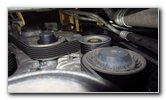 |
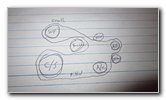 Belt Routing Diagram |
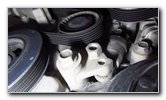 Tensioner Pulley & Arm |
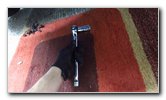 Socket & 1/2" Ratchet |
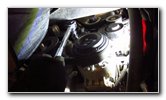 Socket On Tensioner Hex |
| The tensioner
pulley and arm assembly is situated near the middle of the passenger side of
the engine. Attach the 19mm socket to the 1/2" ratchet or a long handled 1/2" drive breaker bar. Locate the hex head "fake" / "false" / "dummy" nut on the tensioner assembly. If you look at Picture # 19 in the row above, you'll see a red arrow pointing to the tension release nut on the tensioner arm situated just below the tensioner pulley. Do NOT rotate the bolt at the bottom of the tensioner assembly with the number "10" printed on it. This bolt holds the tensioner assembly in place to the engine. Place the 19mm socket over the false hex nut attached to the tensioner arm. |
||
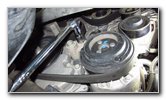 Release Tension On Belt |
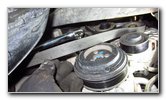 Slip Old Belt Off Pulleys |
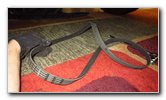 Old Belt Removed |
| Rotate the ratchet
or breaker bar handle forward towards the front of the SUV. If you view Picture # 22, you'll see a red arrow pointing in the correct direction that you'll need to rotate the bottom of the ratchet or breaker bar. As your rotate the ratchet handle towards the front of the SUV, the tensioner arm and pulley will rotate back towards the rear of the vehicle. Hold the tensioner arm in the released position with one hand. Very carefully use your other hand to slip the old belt off the A/C compressor pulley or the crankshaft pulley.
Slowly release the tensioner arm and allow it to swing back into its resting position. Continue slipping the old belt off the other pulleys including the alternator, idler pulleys, water pump, crankshaft and A/C compressor. |
||
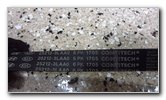 OEM Kia Part Number |
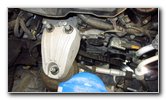 Lower In New Belt |
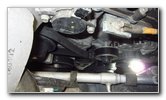 Wrap Belt Around Pulleys |
| Inspect the old
belt and look for any cracks, exposed metal cables or chunks of missing
rubber. If the old belt is still in decent condition, consider keeping it as an emergency backup part just in case the new belt fails prematurely. The OEM belt was marked as part number Hyundai / Kia 25212-3LAA0 6 PK 1705 ContiTech (Made In Romania). Check to see if the two idler pulleys and the tensioner pulley spin freely. If the pulleys are difficult to spin, make noise or wobble, the bearings might be worn out and the pulleys should be replaced. The compatible replacement part numbers for the pulleys are as follows: Tensioner Pulley - Dayco 89133 and Idler Pulleys - Dayco 89164. If the old belt was loose or the tensioner arm was very easy to rotate back, you may need to replace the tensioner assembly. The tensioner assembly replacement part numbers include the following: Hyundai / Kia 25281-3C100 (252813C100), ACDelco 39104, Dayco 89654 and Gates 39104. Lower a new compatible replacement aftermarket belt such as the Gates K060747 down into the engine bay. Begin by wrapping the new belt around the large crankshaft pulley. |
||
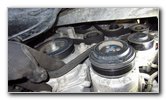 Holding Last Loop |
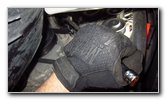 Rotate Tensioner Arm |
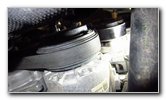 Slip Belt Over Pulley |
| Then route the belt
in front of the tensioner, around the water pump, below the upper idler,
around the alternator, behind the lower idler and hold the last loop near
the A/C compressor. Hold the last loop of the new belt in place near the A/C compressor pulley. With your other hand, rotate the tensioner arm back to the released position. Very carefully slip the last loop of the new belt over the A/C compressor pulley.
|
||
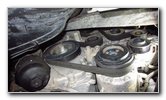 New Belt Installed |
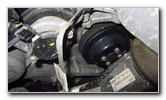 |
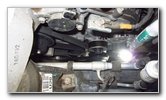 Double Check Routing |
| Double check that
the new belt is properly routed and fully seated on all of the ribbed
pulleys. I created a rough drawing of the belt routing diagram which is shown in Picture # 18. Make sure that the ribbed side of the new belt is wrapped around the ribbed pulleys and the flat side of the belt is situated against the smooth tensioner pulley and two idler pulleys. |
||
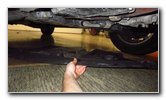 Slide Forward Cover |
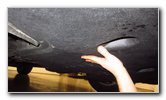 Hold Cover In Place |
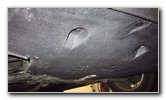 Spin In Bolts |
| Once you are
certain that the new belt is properly installed, slide the fabric / plastic
under engine cover forward and hold it in place with one hand. With your other hand, spin in the bolts a few turns by hand in the clockwise direction. |
||
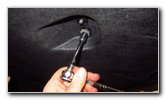 Tighten Clockwise |
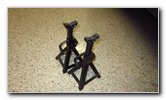 Lower Car From Stands |
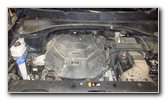 Belt Replacement Done! |
| Tighten the eleven
bolts on the "skid plate" until they are snug. Carefully lower the SUV from the jack stands by using the floor jack. Start the engine and listen closely for any strange noises. If you do hear any strange sounds, immediately turn off the ignition and check the belt installation again. Don't forget to write down the belt change in your vehicle's service records. Please
take a look at
all of my
2016-2020 Kia Sorento DIY Repair & Maintenance Guides. |
||
| If you found this guide to be helpful,
please consider making a small donation by clicking on the PayPal.com
"Donate" button located to the right of this paragraph. Thank you!
(Note: I am not a registered charity. Donations are not tax deductible.) |

